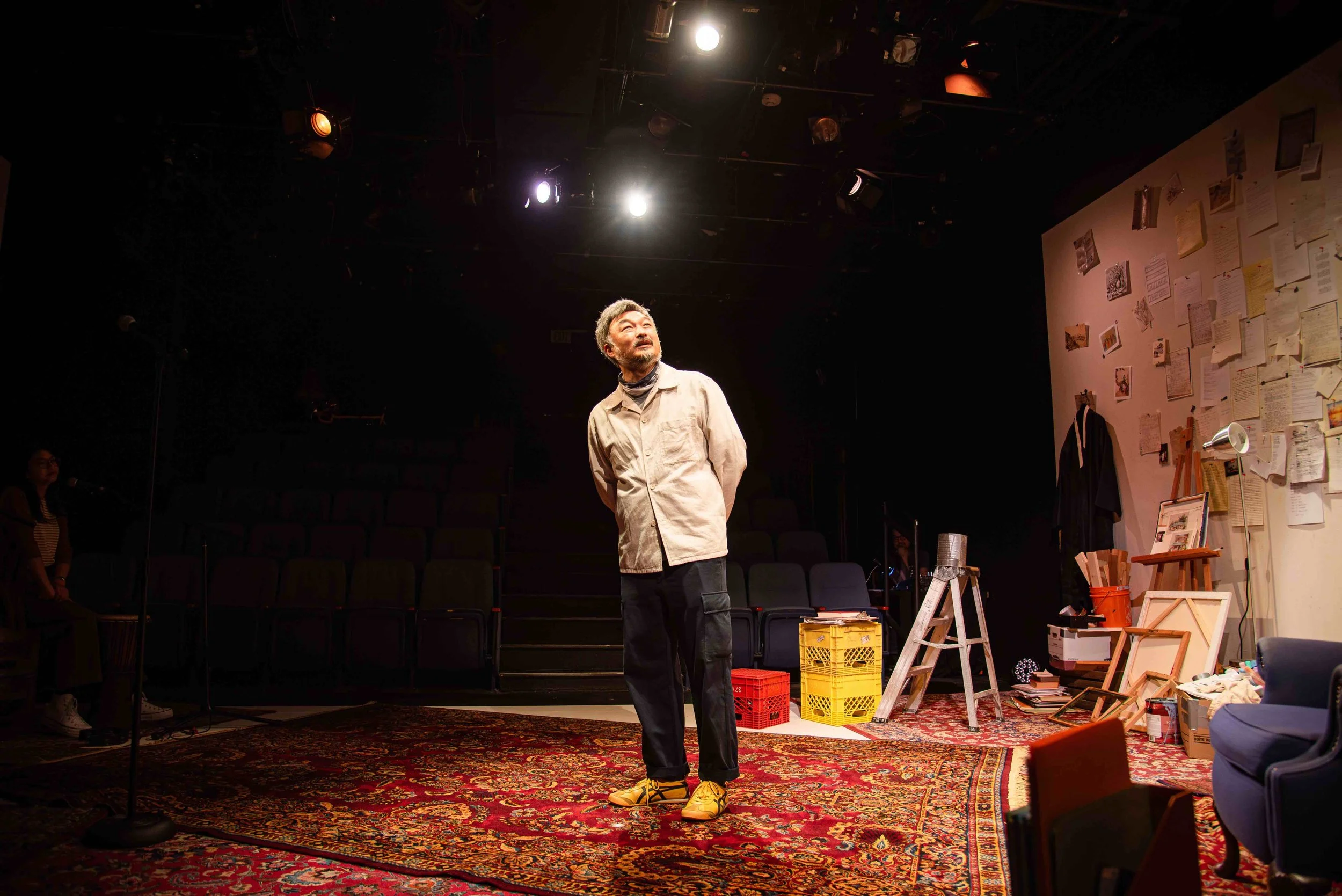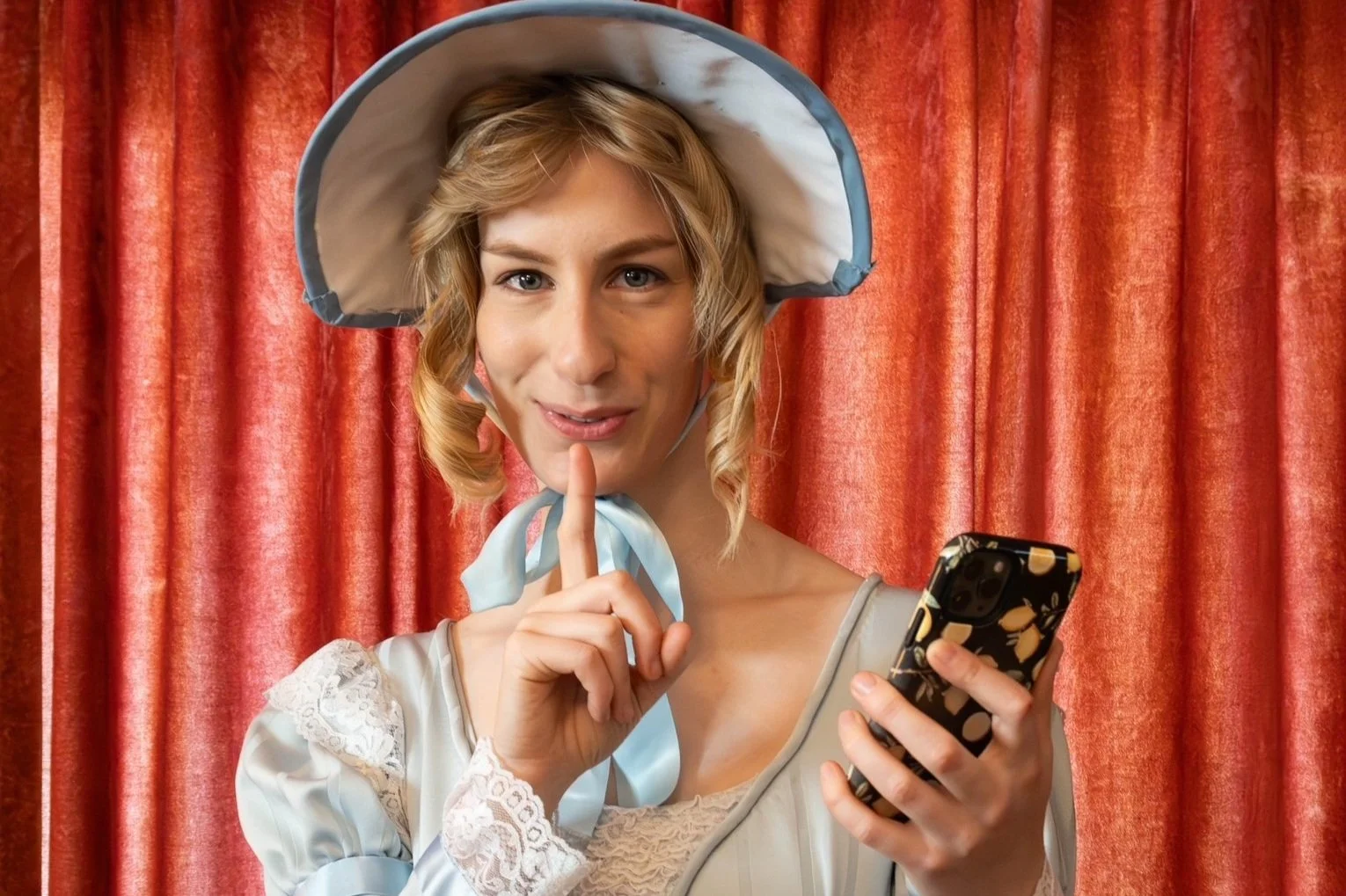Theatre review: Morag, You're a Long Time Deid innovates in ways that defy the term "musical"
Claire Love Wilson’s sublime voice drives a piece that turns Strathcona space into an old-timey Ceilidh hall
Claire Love Wilson’s Sam parallels her own journey of queer self-discovery with that of the grandmother she didn’t know. Photo by Pedro Augusto Meza
Touchstone Theatre and frank theatre company present Morag, You’re a Long Time Deid at Russian Hall to June 19
ONE OF THE STRENGTHS that Morag, You’re a Long Time Deid has going for it is its star and co-creator, Claire Love Wilson.
Blessed with a Highland-spring-clear, ethereal voice, she’s as adept at singing transcendent Celtic ballads as confessional Joanna Newsom-esque indie-pop.
Wilson uses looping to innovative theatrical effect, sometimes creating conversations with unseen ghosts from the past, sometimes layering atmospheric rhythms with her own vocalizations and accompaniment by multi-instrumentalist and singer Sally Zori. In fact, you yearn for more of her songs in this experimental work—one that the term “musical” doesn’t quite encapsulate. Often, it feels more like a poem-conversation with the audience, punctuated by songs.
Playing a character named Sam, Wilson builds an effervescent, authentic rapport with viewers with her personally inspired tale of a woman who bonds across the centuries with a Scottish grandmother who was queer—like her granddaughter.
That rapport is important to a production whose storyline is more elliptically poetic than narratively driven—occasionally too much so.
At the intimate Russian Hall, audience members seat themselves at little cabaret tables lit by retro lamps that, cleverly, shift hues as part of Wladimiro A. Woyno R.’s overall lighting design. Twinkle lights strung from the ceiling give it all the feeling of an old-timey Ceilidh hall. The stage area criss-crosses in two galleys across that seating area, so the show’s four performers get up-close and personal.
In addition to the live-looping sound, the production ambitiously integrates audience participation and an ever-shifting array of props: microphones drop on cue from the ceiling and hanging suit jackets and prim collars represent characters. When performers aren’t playing, spinning, or moving around an upright piano on wheels—supposedly handed down to Sam by way of her long-gone grandmother Morag—they’re opening it up to find hidden photographs or to make eerie sounds with its strings. It becomes another character.
That kind of lovingly crafted low-tech magic and innovation in the show partly make up for the lack of story in the work’s long first act. Wilson spends a lot of the initial half circling around the main idea that it’s hard to fit into a world conventionally drawn up between “lads and lassies”. Playing wittily with language, she takes time translating some of the Gaelic-infused songs passed down from her Scottish side—including one startlingly offensive ditty that takes a rooster to task for being effeminate. (“Yer chuckin’s a freak fae its bum til its beak.”)
The second act has more momentum, as Sam mirrors her own self-discovery and embracing of her sexuality with a dark turn in her grandmother’s storyline. Here the show starts to reveal real purpose, adeptly juxtaposing levity and tragedy—celebrating queerness, while mourning the oppression of past generations and addressing generational trauma. That’s not an easy thing to do. What’s problematic is that the supposed “mystery” of Sam’s grandmother’s story is transmitted early on, and one wonders if this unconventional musical might be stronger if it weren’t split into a conventional two acts.
Cowritten over eight years with Peter Lorenz, the production has some affecting poetic imagery; there’s a beautiful throughline about birds, wood pigeons and “corbies” (crows), and the bird calls that Sam’s grandfather (played by always charismatic singer Steve Charles) teaches her.
Now, back to the audience-participation bit that, depending on how you feel about being part of a show, may have you wondering if you really need to make the trek to Strathcona for Morag, You’re a Long Time Deid. The production relies quite heavily on who is in the audience on a given night and how much they’ll feel like, say, learning a Ceilidh dance in front of their fellow theatregoers. To be clear: it’s easy to avoid taking part, and Sam has a gently humorous and patient way of steering her volunteers. However it can be work to motivate an audience to interact in the after-chill of post-pandemic times—and that work can sometimes interrupt the flow of this immersive show.
In the end, while Morag, You’re a Long Time Deid is full of innovation, atmosphere, and love, you’re essentially left wanting more: more story, more music, more Wilson. But you have to admire her central quest here: to rewrite all the old songs and stories in new ways.
Multi-instrumentalist Sally Zori in Morag, You’re a Long Time Deid. Photo by Pedro Augusto Meza















